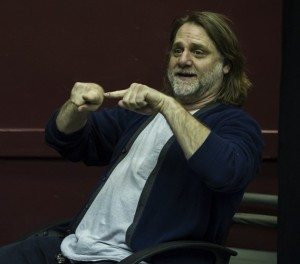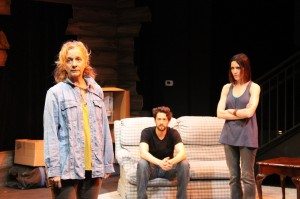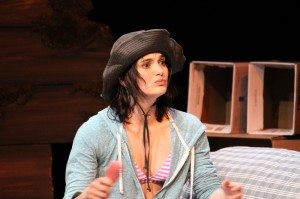
 Hot Season, a new play by Evan Mueller, is guaranteed to give you chills like you've never had before. In this science fiction drama, the horror takes place only a few feet from you -- a very different experience than one you'd have while eating popcorn at the movies. The eerie play takes place in the not-so-distant future when a disastrous uncontrolled epidemic spreads through the city forcing a small group of friends to seek safety in a cabin in the woods.
Hot Season, a new play by Evan Mueller, is guaranteed to give you chills like you've never had before. In this science fiction drama, the horror takes place only a few feet from you -- a very different experience than one you'd have while eating popcorn at the movies. The eerie play takes place in the not-so-distant future when a disastrous uncontrolled epidemic spreads through the city forcing a small group of friends to seek safety in a cabin in the woods.
StageBuddy caught up with director Kevin Kittle to ask about his thoughts on the play, his rehearsal process, and how his own fears inhabit his work.
StageBuddy: What were some of your initial reactions after reading "Hot Season"?
Kevin Kittle: I read a first draft of Hot Season about ten years ago and was so thrilled by it. I thought it was a subject matter that hadn't yet been tackled onstage. Oddly, film and television seem to have caught up to it and it may look to some audience members like they've seen the basic idea before -- World War Z, Walking Dead, Contagion, etc. But, the truth is, this was written before those. And, I still think the play does something unique. It's as much about the human condition as it is about something that seems inhuman. Not to mention, the fact of this occurring LIVE makes the audience more queasy because it feels like you can catch it from sitting in your seat only a few rows away.
 SB: During rehearsal how'd you help move your ensemble into the chaos of an uncontrolled epidemic in the distance?
SB: During rehearsal how'd you help move your ensemble into the chaos of an uncontrolled epidemic in the distance?
KK: We didn't have to look too far because literally on our first day of rehearsal came the initial report of MERS and that guy on the airplane. Evan [Mueller] also told us that when he was researching and talking to people from The Center for Disease Control they speak of it as not IF the next epidemic occurs, it's what is the plan for WHEN it occurs. We also looked at some photos of people ravaged by bubonic plague as well as small pox and other disfiguring diseases. Of course, one does not want to get sick; but especially one does not want to look like that. It's a very particular kind of agony. Eventually we all had to stop looking at photos for research purposes because it was getting hard to sit on the subway next to some guy who had a cough.
SB: Fear tears relationships apart in this play. As a director, how does fear inhibit or influence your work?
KK: I don't like to admit it, but I do tend toward plays that are sort of "ghost stories" or "campfire" stories. I don't want to face what the hell is going on with me that I gravitate to this material, but I love the plays of Don Nigro and Philip Ridley, as well as Jacobean theater and Grand Guignol. I believe there is a darkness in us all and it is necessary to purge it by looking it straight in the face. The disease in Hot Season is metaphorical for a certain element of the journey of life. How do we hold to our humanity when life is largely ugly? And how much of our defensive and shut down behavior is really just a manifest of fear? Our desire and need for safety and security holds us back from deep experience.
SB: If Hot Season were a current disease, which would it be and why?
KK: Well, it's not really a disease but I would say paranoia. A "disease" of the mind. Because the main character, Jake, has had so much devastating loss in his life, he is unable to hold firm to reality and he begins to crack under the possibility of more hurt. He shuts everything down and holes up in a fortress of his own making. But, like a Greek tragedy, the agent of his demise lives within him the entire time.
 SB: What was the collaboration process like with your design team for Hot Season? How did they influence the vision for the play?
SB: What was the collaboration process like with your design team for Hot Season? How did they influence the vision for the play?
KK: The design team's participation is responsible for so much of the audience's experience and response to Hot Season. People see a cabin in the woods that is supposed to be the barrier between the characters and the rotten outside world, but the walls themselves seem to be diseased; the lights never let us forget that nature hovers, sometimes ominously, and that without electricity the group only has the light of lanterns at night; the characters' clothing becomes more and more distressed; and a constant sound of bugs make the audience wish they had brought some Off! The environment is another character in the play and my designers bring it all to life to the great discomfit of the audience.
SB: What advice do you have for young directors in the industry?
KK: The only advice I have is what Peter Brook once wrote to a young director -- there should be no such thing as an out of work director. Unlike actors who often need a director to hire them, the director needs no one to give them the go ahead to work on a project. Just get some people together and do it. My happiest recent experience is that some of my former students did Hamlet in their backyard in Brooklyn. They used the yard and the fire escape and the roof of the building. The director was concurrently acting in a very successful play Off-Broadway. He was receiving great audience and critical response with a reputable company. But, I think he was more excited to be directing Shakespeare in a yard in Brooklyn where the audience sat on lawn chairs.
At the Sheen Center through June 28th.